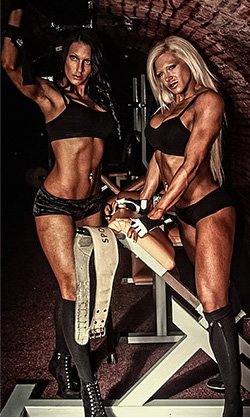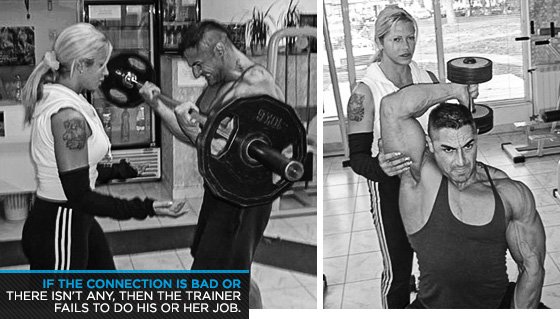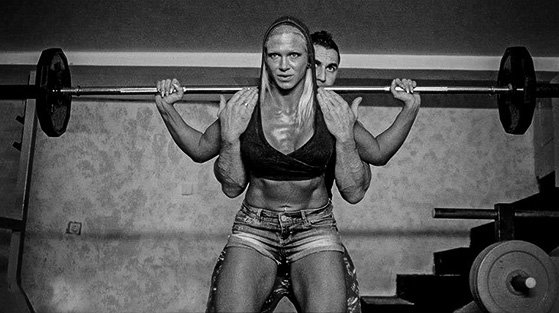New York is a busy city with busier people. To train the movers and shakers, the businessmen and bodyguards, you have to understand the pressure they're under, and be willing to do battle with some of the world's biggest egos.
Marsela Ilic is up to the task. She knows how to keep a foot in the two worlds of competition and preparing other people to be in the best shape of their lives.
She's an IFBB figure competitor, but also travels the globe to train her busy clients. She operates out of two Manhattan gyms, but also owns her own gym back home in Belgrade, Serbia.
This trainer isn't for the weak-willed. She demands total commitment, but can back it up with results. Get to know "Ella" Ilic, our personal trainer of the month!
I fell in love with sports a long time ago, and I've been competing since elementary school. First it was dancing, then jazz ballet, and then seven years of aerobics. From 2006 to this day I've basically never left the gym. I started competing in figure, and everything that surrounds the competitive circuit led me to help others reach their goals, just as I do for myself.
.jpg)
"Old school" will never be overrated, but I when it comes to obesity, I use unique systems that always produce results. When a beginner becomes experienced enough, I begin with the cycle method, dropsets, and polygon workouts. If I'm preparing an athlete for a contest, the training method depends on the category and physical conditioning they need.
I was most proud of my work with Jovica Jovanovic, a competitor who was preparing for the Body Classic Category State Championship in 2012. Just eight weeks out, everything was going as planned, but then daily obligations, work, and the fatigue of competition caught up with him and made him believe that he should move up to the 90 kg-and-under category.
I always keep in mind the psychological type of my clients, and at that moment I sincerely started to think that he didn't trust me. He became demotivated. But around four weeks out, I successfully convinced him that he could lose the few pounds he needed in that short time to compete as he had originally planned.
We started working twice as hard. Dieting was unbelievably hard—but then we made it! At competition he measured exactly 82 kg, the maximum allowed for the weight class. He took first place in the category Body Classic up to 180 cm at State Championship out of seven competitors. His were my hardest preparations so far, because of the timing and the late, extreme exertion of the competitor.

Lots of VIPs, bodyguards doing condition training, and athletes.
There is no unique diet or training. It depends on every person. Protein intake depends on a lot factors like weight, goal, gender, and carbs intake.
Also, some of my clients are vegetarian, so the diet is completely different. Some of my clients are trying to become pregnant, so that calls for sweeping changes in nutrition and vitamin intake.
So it goes with training; we change. Many clients come with injuries; some of them are athletes who hire me to find the right exercise to gain, reduce, or tone the part of their body that suffers most from the injury.
Missing the point of nutrition. When it comes to training, nobody wants to waste their money, so they appear for sessions. But one thing a trainer has to do is make the client follow a proper nutrition plan, and the bad part is we can't lock their refrigerators.
They make a bad connection with the client. Having no chemistry creates a distance between clients and trainers. This is a relationship in which we change their lives. It's not just work, it's the work you must love to do.
When they start feeling good about reaching the results, they fall in love, get more satisfied, and lose depression of any kind. If the connection is bad or there isn't any, then the trainer is failing to do his or her job. No trust means no results.
We are made of the food we take in. Training results are tightly connected with nutrition, so everything must be planned and followed. I monitor the progress and change it in a flow, and I never miss out on results.

Ask them! I keep them motivated by constantly scaling and measuring, conversing about daily routine, and personalizing with them. When the routine becomes boring, even if it brings results, we must change it or we'll lose motivation. That's a huge thing about getting a client to their goal.
Male clients are totally different than females—competitors especially. The main thing in both is psychology of the person. Do they like motivational speech or not? Do they like being seen on the floor or not? The first thing I do is make them feel comfortable in the area they need to work out in.
I haven't! I always approach them as people who need me, and from it I always get respect and love. I never know who is happier when they reach the goal: me or the client.
Yes. I do an assessment based on flexibility, endurance, and strength.

It depends. If it's an athlete preparing for competition I prefer male preparations, and if it's obesity we are dealing with, I prefer to train females.
I like both because they are great challenges for me. Male clients training for competition need to gain a lot of trust when they have a female trainer. Obesity training with a female can be even more challenging because of the estrogen levels that women deal with every month, or even every day.
Yes, I do. Relationships between the client and trainer are real relationships. We go through ups and downs, but make sure we do what's best for the client to get them back on track.
